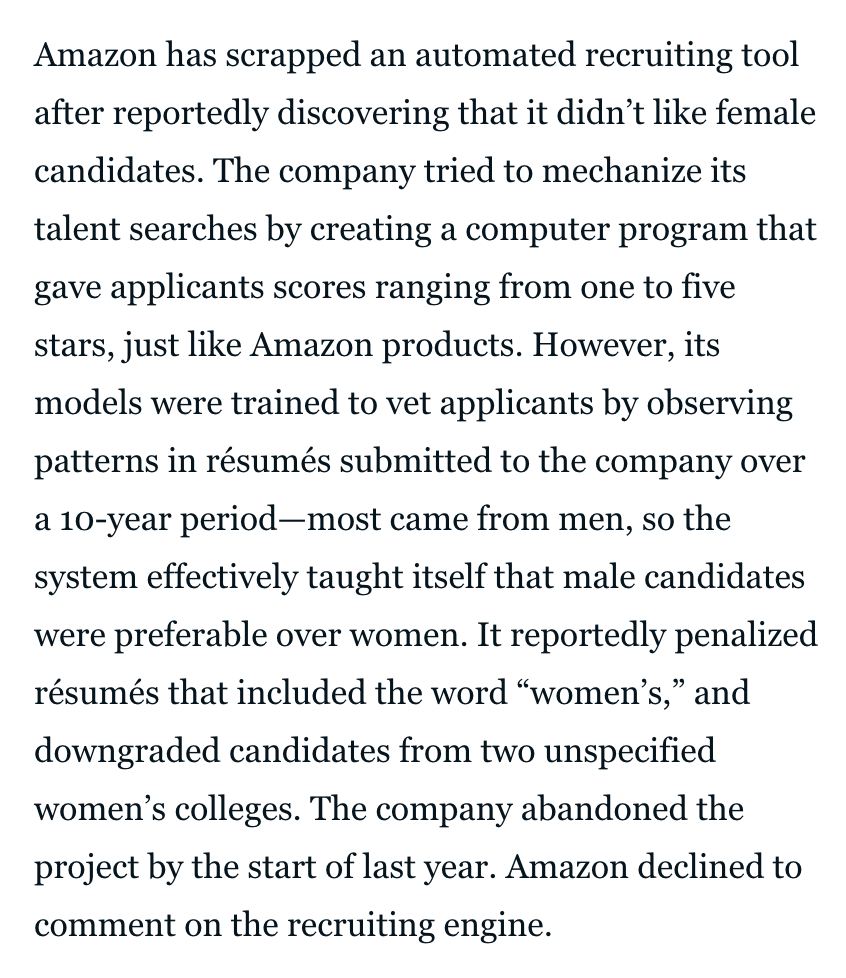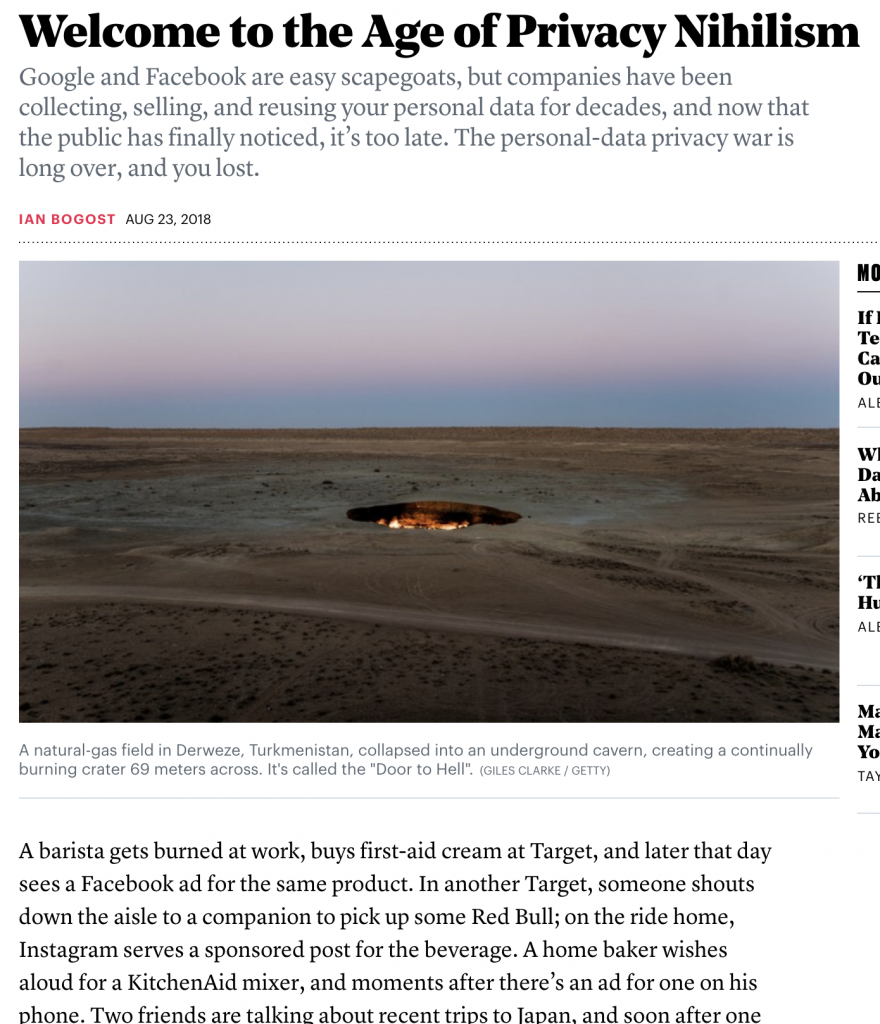Introduction
• “Weapons of Math Destruction” WMDs
• “value-added modeling” algorithm and feedback loops
• “statistical systems require feedback”
• “Ill-conceived mathematical models now micromanage the economy”
• difference between school district WMDs vs. business WMDs?
On the Job
• “clopenings” and scheduling software
• “operations research” (OR) and “Just in Time” manufacturing.
• Cataphora’s idea generation software
• sociometric badges
• Simpson’s paradox and the essential randomness of value-added models
Civic Life
• Facebook’s “voter megaphone” experiment
• Facebook’s “news from friends” experiment
• Facebook’s mood experiment
• focus groups -> direct-mail campaigns -> microtargeting
• proxies for data, profiling buckets. “shift from region to individual”
• television’s move to personalized advertising
Conclusion
• Bottom lines vs. by-products of fairness
• Hippocratic oath for data scientists?
• what would a regulatory system for WMDs look like?
• “mathematical models [are] the engines of the digital economy”
• (how) can Big Data algorithms be used for positive, democratic reasons?
Author Archives: Kevin L. Ferguson
Amazon’s Sexist AI and Alexa Offering Therapy?
“It’s Not an Intruder. It’s Alexa Asserting Her Independence.
Amazon’s Echo device and Alphabet Inc.’s Google Home can handle a growing array of tasks—they are also freaking people out.”

Amazon Ditches AI Recruiting Tool That ‘Didn’t Like Women’

https://www.thedailybeast.com/amazon-ditches-ai-recruiting-tool-that-didnt-like-women
Dear Data
The Filter Bubble
Introduction
• Personalization vs. democracy?
• Google meant to “tell us what we should be doing next”
• filter bubble: alone in it, invisible, not chosen
• search algorithms construct theories of self
• every technology has an interface. what does the filter bubble’s look like?
• “informational determinism,” “global lobotomy”
The You Loop
• “one identity”? what is the interplay of identity and personalization? “fundamental attribution error”
• Facebook vs. Google’s personalization. aspirational vs. current selves, the “present bias.”
• persuasion profiles
• search without search, the “priming effect”
• “local-maximum problem,” identity loops, and “overfitting”
What You Want, Whether You Want It or Not
• advertars and robotic assistants
• search by face, ambient intelligence and IoT
• algorithmic black box
• advertiser-funded media
• website morphing
• people filtering
Googlization
Introduction
- “Three large areas of human concern and conduct” (2):
• us
• the world
• knowledge - Is Google evil?
- public failure: “public institutions are relieved of pressure to perform their tasks well” (6)
- pg. 7: “the big questions facing us in the coming years”
- “technocultural imagination” (8)
Chapter 6: Googlization of Memory
- knowledge vs. information (175)
- “filter failure”
- “Forgetting is just as important to the act of thinking as remembering” (177)
- electronic media simulate evolution? (181)
- “narrowcasting,” personalization, and “different discourse communities” (182–184)
- Google borrows from academia (peer review)?
- criticisms of Google Scholar (192–194)
Big Data
Datafication
Quantifying the world
• double-entry bookkeeping, math, navigation
When words become data
• content vs. data | digitizing content vs. datafying content
When location becomes data
• GPS, longitude/latitude system
• insurance from pooled risk to individual action. reality mining.
When interaction becomes data
• facebook, moods datafied
Datafication of everything
• floors
• the “quantified self”
–>What is the relationship of datafication to quantification? of datafication to digitization?
Risk
Privacy
• secondary users of data
• big data aids deanonymization
Probability and punishment| Propensity vs. prevention
• predictive policing
• profiling
• correlation vs. causation
Fetishization
–>What three broad features of a data privacy policy do you think are essential?
Everybody Lies
- Reconsider what we consider “data.”
- Bodies
- Words
- Pictures
- The search for information is information.
- Google searches provide a unique insight into “human psyche.”
What was the most surprising result and why?
What limitations can we see with this method?
What is a research question that we can investigate with Google Trends and Correlate?
link: “23andMe Is Terrifying”
“…That’s just the beginning, though. 23andMe reserves the right to use your personal information—including your genome—to inform you about events and to try to sell you products and services. There is a much more lucrative market waiting in the wings, too. One could easily imagine how insurance companies and pharmaceutical firms might be interested in getting their hands on your genetic information, the better to sell you products (or deny them to you). According to 23andMe’s privacy policy, that wouldn’t be an acceptable use of the database. Although 23andMe admits that it will share aggregate information about users genomes to third parties, it adamantly insists that it will not sell your personal genetic information without your explicit consent.
We’ve heard that one before.”
link: “Yahoo, Bucking Industry, Scans Emails for Data to Sell Advertisers”

. . . Initially, Yahoo mined users’ emails in part to discover products they bought through receipts from e-commerce companies such asAmazon.com Inc., people familiar with the practice said. Yahoo salespeople told potential advertisers that about one-third of Yahoo Mail users were active Amazon customers, one of the people said. In 2015, Amazon stopped including full itemized receipts in the emails it sends customers, partly because the company didn’t want Yahoo and others gathering that data for their own use, someone familiar with the matter said. . . .
link: “Welcome to the Age of Privacy Nihilism”
https://www.theatlantic.com/technology/archive/2018/08/the-age-of-privacy-nihilism-is-here/568198/

“A barista gets burned at work, buys first-aid cream at Target, and later that day sees a Facebook ad for the same product. In another Target, someone shouts down the aisle to a companion to pick up some Red Bull; on the ride home, Instagram serves a sponsored post for the beverage. A home baker wishes aloud for a KitchenAid mixer, and moments after there’s an ad for one on his phone. Two friends are talking about recent trips to Japan, and soon after one gets hawked cheap flights there. A woman has a bottle of perfume confiscated at airport security, and upon arrival sees a Facebook ad for local perfume stores. These are just some of the many discomforting coincidences that make today’s consumers feel surveilled and violated. The causes are sometimes innocuous, and sometimes duplicitous. As more of them come to light, some will be cause for regulatory or legal remedy.
But none of this is new, nor is it unique to big tech. Online services are only accelerating the reach and impact of data-intelligence practices that stretch back decades. They have collected your personal data, with and without your permission, from employers, public records, purchases, banking activity, educational history, and hundreds more sources. They have connected it, recombined it, bought it, and sold it. Processed foods look wholesome compared to your processed data, scattered to the winds of a thousand databases. Everything you have done has been recorded, munged, and spat back at you to benefit sellers, advertisers, and the brokers who service them. It has been for a long time, and it’s not going to stop. The age of privacy nihilism is here, and it’s time to face the dark hollow of its pervasive void.”


